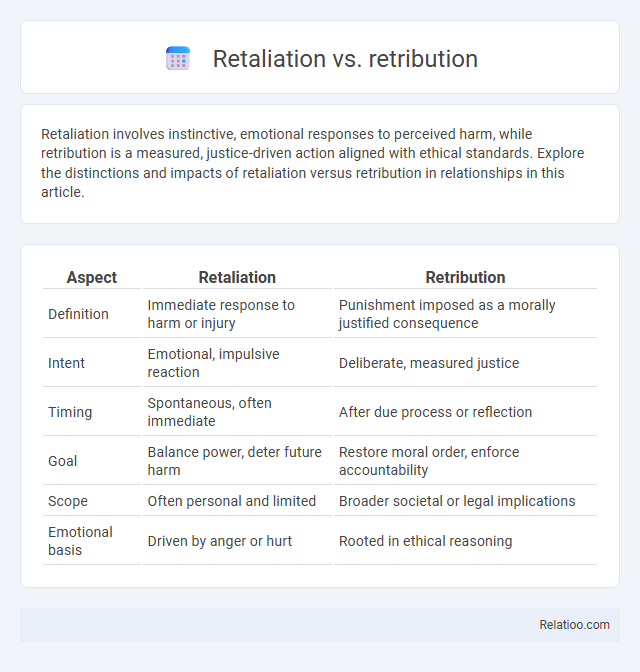Retaliation involves instinctive, emotional responses to perceived harm, while retribution is a measured, justice-driven action aligned with ethical standards. Explore the distinctions and impacts of retaliation versus retribution in relationships in this article.
Table of Comparison
| Aspect | Retaliation | Retribution |
|---|---|---|
| Definition | Immediate response to harm or injury | Punishment imposed as a morally justified consequence |
| Intent | Emotional, impulsive reaction | Deliberate, measured justice |
| Timing | Spontaneous, often immediate | After due process or reflection |
| Goal | Balance power, deter future harm | Restore moral order, enforce accountability |
| Scope | Often personal and limited | Broader societal or legal implications |
| Emotional basis | Driven by anger or hurt | Rooted in ethical reasoning |
Understanding Retaliation and Retribution
Retaliation refers to an act of responding to an injury or offense with a similar harm, often driven by immediate emotional reaction, whereas retribution involves a more deliberate and morally justified punishment aimed at restoring justice. Understanding retaliation requires recognizing it as a reaction motivated by self-defense or revenge, frequently escalating conflicts. Retribution, by contrast, is grounded in ethical or legal principles, emphasizing proportionality and fairness in addressing wrongdoing.
Defining Retaliation: Key Characteristics
Retaliation involves responding to an action or harm with a corresponding counteraction intended to deter or punish the original offense. Key characteristics of retaliation include its reactive nature, intent to address perceived wrongs, and often immediate, emotionally charged response. Understanding these traits helps Your ability to distinguish retaliation from retribution, which is more formal, measured, and justice-oriented.
Defining Retribution: Core Principles
Retribution centers on the principle of just deserts, ensuring that punishment is proportionate to the moral gravity of the offense committed. It emphasizes accountability and moral balance, where offenders receive penalties reflecting the severity and nature of their wrongful acts. Retribution differs from retaliation and revenge by prioritizing fairness and legal standards over emotional responses or personal vendettas.
Historical Perspectives on Punishment
Historical perspectives on punishment reveal distinct nuances between retaliation, retribution, and retaliation, each shaping justice systems differently. Retaliation focuses on immediate, equivalent response to harm, often seen in ancient tribal laws where "eye for an eye" was practiced. Retribution evolved as a more structured form of justice emphasizing moral balance and proportional punishment, reflecting societal values and legal principles that aim to deter crime while satisfying communal notions of fairness. Your understanding of these concepts highlights how punishment philosophy has shifted from personal vengeance to codified legal frameworks.
Philosophical Foundations: Ethics of Justice
Retaliation involves responding to harm with equivalent harm, often driven by instinctual or emotional reactions, whereas retribution emphasizes a structured ethical philosophy of justice focused on proportional punishment and moral desert. Retribution aligns with principles of fairness and societal order, grounded in theories of just deserts, while retaliation may lack ethical justification and risk perpetuating cycles of violence. Philosophically, retribution embodies a normative framework balancing harm and punishment to uphold justice, contrasting with retaliation's reactive and potentially unjust nature.
Legal Contexts: Retaliation vs Retribution
In legal contexts, retaliation refers to adverse actions taken against an individual for engaging in legally protected activities, such as whistleblowing or filing a complaint, and is prohibited under laws like Title VII of the Civil Rights Act. Retribution, by contrast, denotes punishment imposed as a form of justice or deterrence, typically in criminal law, and is not related to the protection of a claimant's rights. Understanding the distinction is critical for applying civil rights protections versus criminal justice principles, with retaliation focusing on unlawful employer responses and retribution centered on penal consequences.
Psychological Motivations Behind Responses
Retaliation involves immediate responses driven by emotional impulses to perceived harm, often fueled by anger or fear, while retribution is motivated by a desire for justice and moral balance, emphasizing fairness and proportionality. Psychological motivations behind retaliation include threat response and self-defense mechanisms, whereas retribution stems from societal norms and the need to restore social order. Understanding these distinctions highlights how emotional regulation and moral reasoning influence human behavior in conflict situations.
Societal Impacts of Each Approach
Retaliation often escalates conflict within societies by perpetuating cycles of aggression, undermining social cohesion and trust. Retribution emphasizes justice and moral balance, which can restore order but may also entrench divisions if perceived as disproportionate or vindictive. Your understanding of these approaches influences how communities manage conflict resolution, affecting long-term stability and reconciliation efforts.
Case Studies: Real-world Applications
Case studies demonstrate the nuanced differences between retaliation, retribution, and revenge in legal and psychological contexts, highlighting how courts often differentiate retaliation--illegal punitive actions from employers--from retribution, a lawful penalty aligned with justice systems. Your understanding of these distinctions is crucial when analyzing workplace discrimination cases, where retaliation claims involve adverse actions following complaints, whereas retribution reflects society's structured justice. Real-world applications reveal that while revenge is driven by emotional responses, retaliation and retribution are embedded within legal frameworks influencing outcomes in both criminal and civil law.
Moving Forward: Balancing Justice and Fairness
Balancing justice and fairness in moving forward requires distinguishing retaliation, retribution, and retaliation as distinct concepts impacting decision-making. Retaliation involves impulsive responses, often escalating conflict, while retribution emphasizes proportional punishment aligned with legal and ethical standards. Implementing procedures that prioritize restorative justice fosters fairness, repairs relationships, and supports sustainable resolutions.

Infographic: Retaliation vs Retribution
 relatioo.com
relatioo.com